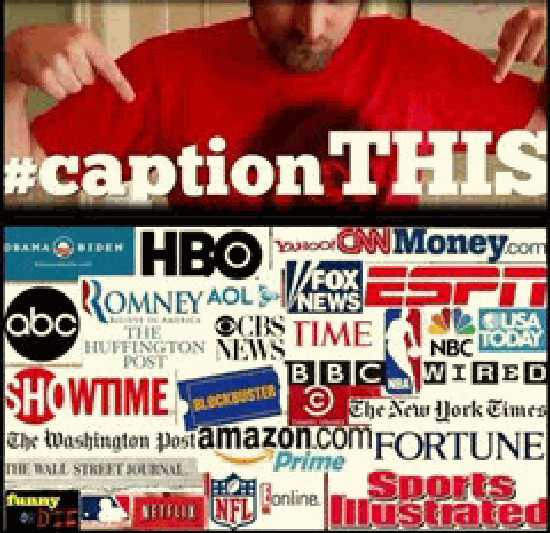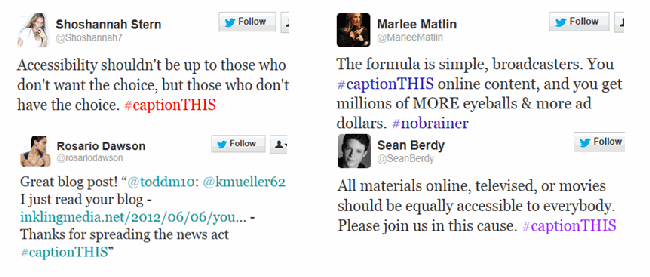Hashtag Revolution: Changing Our World with #captionTHIS
Posted by: Staff Writer on June 11, 2012

Behold the power of the social media. Did you notice the #captionTHIS tweets and Facebook posts last week? The simple pound key (“#”) has sparked a grassroots revolution that’s spreading to mom-and-pop operations and large Fortune 500 companies. The driving force behind the hashtag: The urgent need to put captions on more online media.
Concepted by Adam Jarashow and filmed by Megan Malzkuhn, with help from CaptionASL, the “captionTHIS Video” already has over 43,000 views and countless tweets and Facebook posts. “I'm genuinely concerned,” signs Jarashow. “As Internet is growing at a rapid pace, and the Deaf community is lagging even further behind, because we're lacking access to information.”
Is it a meme? Is it lobbying? Is it a digital nag? Is it a motivational movement? Probably all of the above.
Though scheduled for June 6, 2012 #captionTHIS will have a long-term effect. As we wait with baited breath for the September execution of the FCC Internet captioning rulings, now is not the time to slow down our efforts.
We still have a hurdle: Convincing companies that these captions are worth every cent, and not just something they’re forced into. What happened on June 6 was a lot of diverse tweetivity, which we’ll boil down into waves:
Wave One
On June 6, celebrities (Deaf and hearing) start endorsing the #captionTHIS concept. This compels their thousands of followers, who in turn gain the confidence to start tweeting the companies that don’t meet their accessibility needs.

Wave Two
Some content and media providers get on the reply bandwagon. Still no word from @netflix, which is currently juggling a lawsuit with NAD (National Association of the Deaf) to caption their content; nor from @CNN, which is also in a lawsuit to close caption their content with the Greater Los Angeles Agency on Deafness.

Wave Three
Getting the concept of universal access and captioning “off the ground,” tweets go out to major airlines such as United and JetBlue Airways. Fliers explain that being cut off from in-flight movies (due to lack of captions) is no bueno, and they get some answers:

Wave Four
Geeks, who are on the fringe of the politics but at the core of captioning technology, get on the hashtag bandwagon. They enthusiastically offer hands-on ideas for DIY captions and web development tips for media and content provider businesses:

So, with all our efforts in hastagging #captionTHIS on June 6th, did we “win”?
Certainly, Rome wasn’t built in a day, and a fully-captioned world won’t happen from June 6th alone. But hey, it’s working! Not only has it provoked replies from content providers, but other businesses that are indirectly connected to the media-streaming world – such as airlines.
Remember the “We are the 99%” movement? The math is similar: Nearly 99% of all online media remains uncaptioned. Even Business Insider just revealed the growing trend of no one really watching TV anymore. So if we’re not getting captions from TV, there is a huge demand for online CC. And an unforgivably huge market of untapped accessibility needs.
Last time we checked, hashtags don’t die. So you can continue to use #captionTHIS in your tweets. Remember, 2.2 million #sopa tweets brought SOPA to its knees, and Congress listened. We still have a LONG list (see action item 2 on the Deaf Politics Blog) of companies that have a ways to go in making world a more accessible place.
What are you waiting for? @deafreview says: Let’s #captionTHIS!
Tags
- hashtag
- captionthis
- fortune 500
- deaf
- hard of hearing
- deaf blind
- deaf friendly
- marlee matlin
- shoshannah stern
- rosario dawson
- sean berdy
- hulu
- netflix
- cnn
- united
- jetblue
- html5




Comments